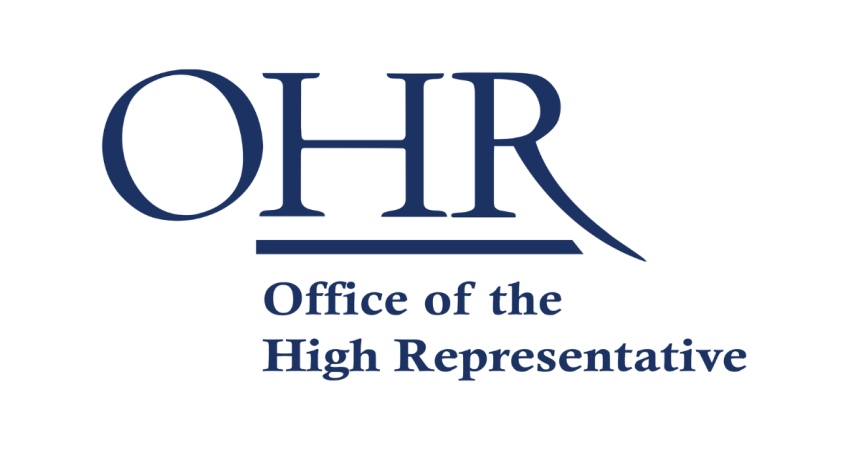What prompted the High Representative’s recent decision?
- All budget calendar deadlines for adopting a state budget for 2025 have long passed. Consequently, since the beginning of 2025, state institutions have been forced into temporary financing, thus endangering the functionality of the state and undermining its resilience.
- Deadlines related to crucial preparations for the 2026 general elections have been reached. The president of the CEC has repeatedly warned that time was running out and that the end of June was the deadline for securing funds for the introduction of election technologies across the country for the 2026 elections. The CEC needed those funds urgently to initiate procurement procedures, which are time consuming. A failure to introduce the new election technologies in full and across the country would severely damage voter trust in the fairness of these crucial elections.
- Outstanding debts, such as the one of Republika Srpska to the Viaduct company, threatened the financial viability of the country and threatened its key institutions, especially the Central Bank and BHANSA.
- The final and binding decision of the Washington arbitration (ICSID) established the obligation to compensate Viaduct for the damages caused by Republika Srpska’s unilateral withdrawal from a concession agreement. ICSID is one of the five organizations of the World Bank Group and is the world’s leading institution devoted to international investment dispute settlement.
- The debt was therefore established by international arbitration, which decided on the case in light of all elements brought to its attention. The Republika Srpska participated in the proceedings and had the possibility to raise all objections they may have had.
- Political deadlock at the state level continues to block solutions and fuel uncertainty.
What is the overall goal of this framework?
- To prevent the entities or other levels of government – like cantons, municipalities, or cities – from burdening the State with liabilities caused by them over which the State had no information nor control whatsoever or from withholding state revenues. This will remove the imminent risk to adequate, sustainable, and fair financing of BiH institutions and will provide legal instruments for protection of foreign investments.
- To enable funding for the BiH Central Election Commission (CEC) to introduce election technologies, i.e. election integrity measures, for the 2026 general elections.
- To remove threats to BiH Institutions of critical infrastructure that are affected by the Viaduct vs Bosnia and Herzegovina case. Specifically, the threat of the seizing of assets of the Central Bank of Bosnia and Herzegovina and the freezing of the account of Bosnia and Herzegovina Air Navigation Services Agency (BHANSA) at EUROCONTROL.
How would the High Representative decision affect the adoption of the BiH budget?
- Reliable financing of state institutions is crucial for BiH’s stability, functionality, and resilience.
- The Decision resolves two key problems:
- It identifies a source for settling the debt to Viaduct without any threat to the fiscal stability of any level of government.
- It identifies the purpose of the BiH Central Bank profits, thereby also ensuring that the CEC is funded appropriately to prepare for the 2026 elections.
- The High Representative’s Decision therefore will remove remaining obstacles to the adoption of the 2025 budget.
What will be done according to the High Representative’s decision?
- A portion, 120 Mio KM out of a total of ca. 316 Mio KM, of the settlement reserve from the road toll revenues accumulated since 2018—will be redirected to settle the Viaduct claim, with the understanding that it comes from the share of Republika Srpska. This is fully in line with the principle that the one who incurs the debt must also pay it. The Decision of the High Representative does not imply any obligation to pay the damage to one particular account. To the contrary, when releasing the funds, the Minister, or his Deputy if the Minister fails to do so, need to exercise due diligence.
The FBiH will receive the equal amount from the same source, without having, so far, obligations similar to the Viaduct case. - The Viaduct debt payment is taken from a source that has been blocked since 2018 and is not intended for RS current (regular) budget expenditures. The decision is not going to have an impact on citizens’ pensions or on salaries of public employees.
- The share of the profits of the Central Bank, ca. 244 Mio KM, that by law should be passed to the State, will be partially released to finance the election technologies for the 2026 general elections and other needs of BiH institutions.
- Key obstacles will be removed, clearing the way for an adoption of the 2025 budget.
- Bosnia and Herzegovina’s leaders will be provided space to stop stalling and start focusing on the country’s EU reform agenda.














